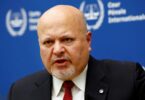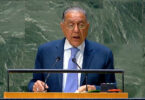YANGON (Agencies): The trial of deposed Myanmar leader Aung San Suu Kyi has gotten under way, more than four months after a military coup. On Monday, the court heard a police major testify that Aung San Suu Kyi broke coronavirus restrictions during last year’s elections that her National League for Democracy (NLD) won in a landslide, while another testified on separate charges accusing her of illegally importing and possessing walkie-talkies, her lawyer Min Min Soe told AFP news agency.
The military rulers have brought an eclectic raft of charges against Aung San Suu Kyi, including claims she accepted illegal payments of gold and violated a colonial-era secrecy law. Aung San Suu Kyi was hit with additional corruption charges on Thursday over claims she illegally accepted $600,000 in cash and approximately 11kg (24.2 pounds) of gold.
Journalists were barred from proceedings in the special court in the capital Naypyidaw, but an AFP reporter said there was a heavy police presence outside. Aung San Suu Kyi’s lawyers, who have struggled to gain access to their client, say they expect the trial to wrap up by July 26. A separate trial is scheduled to start on Tuesday over sedition charges she faces alongside overthrown president Win Myint and another senior member of the NLD.
If convicted of all charges, Aung San Suu Kyi, 75, faces more than a decade in jail. “It is a show trial motivated only by political reasons,” Debbie Stothard, Coordinator of the Alternative ASEAN Network on Burma, told AFP. “Min Aung Hlaing [military chief] is determined to lock up Aung San Suu Kyi for the rest of her life. If he could, he would probably charge her under every law available.”
Human Rights Watch said the allegations were “bogus and politically motivated” with the intention of nullifying the NLD victory and preventing Aung San Suu Kyi from running for office again. “This trial is clearly the opening salvo in an overall strategy to neuter Suu Kyi and the National League for Democracy party as a force that can challenge military rule in the future,” said Phil Robertson, the organisation’s deputy Asia director. Near-daily protests have rocked Myanmar since the generals’ February 1 putsch. A mass uprising has been met with a brutal military crackdown that has killed more than 850 civilians, according to a local monitoring group.
Meanwhile, hundreds of thousands of Myanmar’s anti-military government protesters have flooded social media with pictures of themselves wearing black in a show of solidarity with the Rohingya, a minority group that is among the most persecuted in the country. Since the military overthrew civilian leader Aung San Suu Kyi from power in a February 1 coup, an anti-military movement demanding a return to democracy has grown to include fighting for ethnic minority rights. The mostly-Muslim Rohingya – long viewed as interlopers from Bangladesh by many in Myanmar – have for decades been denied citizenship, rights, access to services and freedom of movement.
In 2017, a bloody military campaign in Myanmar’s west sent about 740,000 Rohingya fleeing across the border into Bangladesh carrying accounts of rape, mass killings and arson. The military has long claimed the crackdown was justified to root out rebels, and Aung San Suu Kyi defended the army’s conduct by travelling to the Hague to rebut charges of genocide at the UN’s top court. The Myanmar public was largely unsympathetic to the Rohingya’s plight, while activists and journalists reporting on the issues faced vitriolic abuse online.
Activists and civilians took to social media to post pictures of themselves wearing black and flashing a three-finger salute of resistance, in posts tagged “#Black4Rohingya”. “Justice must [be] served for each of you and each of us in Myanmar,” prominent rights activist Thinzar Shunlei Yi said on Twitter. Local media also showed a small protest in Myanmar’s commercial hub Yangon, with black-clad demonstrators holding signs in Burmese that said they were “protesting for the oppressed Rohingya”.
By the evening, the #Black4Rohingya hashtag was trending on Twitter in Myanmar with more than 332,000 mentions. Show of support from the mostly Buddhist, ethnic Bamar-majority population is a far cry from previous years when even using the term “Rohingya” was a lightning rod for controversy. Nay San Lwin, co-founder of the Free Rohingya Coalition, told Al Jazeera that the #Black4Rohingya campaign has “received a huge support and solidarity from our fellow Burmese this year”.
“In the past, we only had international supporters but since the coup, we have received public apologies from individuals and organisations in Myanmar,” he added. “The solidarity from our fellow Burmese is very important for us. We were friendless in our own country, regarded like enemies, intruders, interlopers and sub-humans but now many of them accepted Rohingya as their fellow citizens. Many of them realised that they were brainwashed by the military. “The people who used to call us ‘Bengali’ are now calling us Rohingya. That means they are now respecting the very basic human rights.”
Prominent Europe-based Rohingya activist Ro Nay San Lwin told AFP news agency the online campaign is an annual effort to raise awareness but was “the first time” he had seen it go viral in Myanmar. “I am so happy to see those inside Myanmar joined this campaign. I am more hopeful to have a stronger solidarity from them,” he said.






